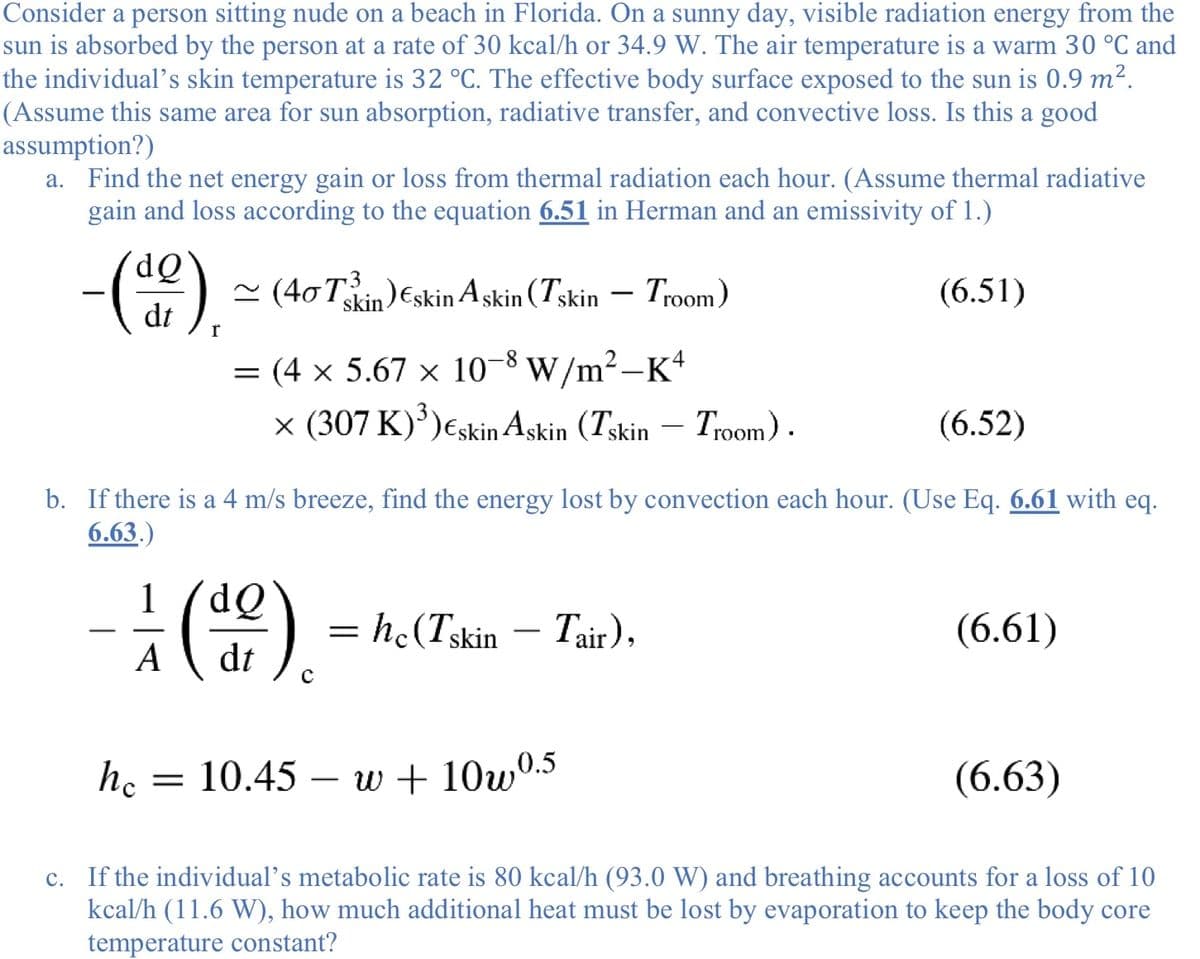Consider a person sitting nude on a beach in Florida. On a sunny day, visible radiation energy from the sun is absorbed by the person at a rate of 30 kcal/h or 34.9 W. The air temperature is a warm 30 °C and the individual's skin temperature is 32 °C. The effective body surface exposed to the sun is 0.9 m². (Assume this same area for sun absorption, radiative transfer, and convective loss. Is this a good assumption?) a. Find the net energy gain or loss from thermal radiation each hour. (Assume thermal radiative gain and loss according to the equation 6.51 in Herman and an emissivity of 1.) - (40 Tin)€skin A skin (Tskin – Troom) (6.51) dt (4 x 5.67 × 10-8 W/m²–K* x (307 K)')eskin Askin (Tskin – Troom) . (6.52) b. If there is a 4 m/s breeze, find the energy lost by convection each hour. (Use Eq. 6.61 with eq. 6.63.) 1 = h.(Tskin – Tair), (6.61) - A dt h. = 10.45 – w + 10w0.5 (6.63) | c. If the individual's metabolic kcal/h (11.6 W), how much additional heat must be lost by evaporation to keep the body core is 80 kcal/h (93.0 W) and breathing accounts for a loss of 10 temperature constant?
Consider a person sitting nude on a beach in Florida. On a sunny day, visible radiation energy from the sun is absorbed by the person at a rate of 30 kcal/h or 34.9 W. The air temperature is a warm 30 °C and the individual's skin temperature is 32 °C. The effective body surface exposed to the sun is 0.9 m². (Assume this same area for sun absorption, radiative transfer, and convective loss. Is this a good assumption?) a. Find the net energy gain or loss from thermal radiation each hour. (Assume thermal radiative gain and loss according to the equation 6.51 in Herman and an emissivity of 1.) - (40 Tin)€skin A skin (Tskin – Troom) (6.51) dt (4 x 5.67 × 10-8 W/m²–K* x (307 K)')eskin Askin (Tskin – Troom) . (6.52) b. If there is a 4 m/s breeze, find the energy lost by convection each hour. (Use Eq. 6.61 with eq. 6.63.) 1 = h.(Tskin – Tair), (6.61) - A dt h. = 10.45 – w + 10w0.5 (6.63) | c. If the individual's metabolic kcal/h (11.6 W), how much additional heat must be lost by evaporation to keep the body core is 80 kcal/h (93.0 W) and breathing accounts for a loss of 10 temperature constant?
Related questions
Question
10.

Transcribed Image Text:Consider a person sitting nude on a beach in Florida. On a sunny day, visible radiation energy from the
sun is absorbed by the person at a rate of 30 kcal/h or 34.9 W. The air temperature is a warm 30 °C and
the individual’s skin temperature is 32 °C. The effective body surface exposed to the sun is 0.9 m².
(Assume this same area for sun absorption, radiative transfer, and convective loss. Is this a good
assumption?)
a. Find the net energy gain or loss from thermal radiation each hour. (Assume thermal radiative
gain and loss according to the equation 6.51 in Herman and an emissivity of 1.)
dQ
3
~ (40Tin)Eskin Askin (Tskin – Troom)
(6.51)
-
dt
= (4 x 5.67 x 10-8 w/m²–K*
|
x (307 K)')€skin Askin (Tskin – Troom).
(6.52)
b. If there is a 4 m/s breeze, find the energy lost by convection each hour. (Use Eq. 6.61 with eq.
6.63.)
1
= h.(Tskin – Tair),
(6.61)
A
dt
he
= 10.45 – w + 10w0.5
(6.63)
-
c. If the individual’s metabolic rate is 80 kcal/h (93.0 W) and breathing accounts for a loss of 10
kcal/h (11.6 W), how much additional heat must be lost by evaporation to keep the body core
temperature constant?
Expert Solution
This question has been solved!
Explore an expertly crafted, step-by-step solution for a thorough understanding of key concepts.
This is a popular solution!
Trending now
This is a popular solution!
Step by step
Solved in 2 steps

Follow-up Questions
Read through expert solutions to related follow-up questions below.
Follow-up Question
How would you suggest that he loses this energy? Explain your answer clearly and convincingly.
Solution